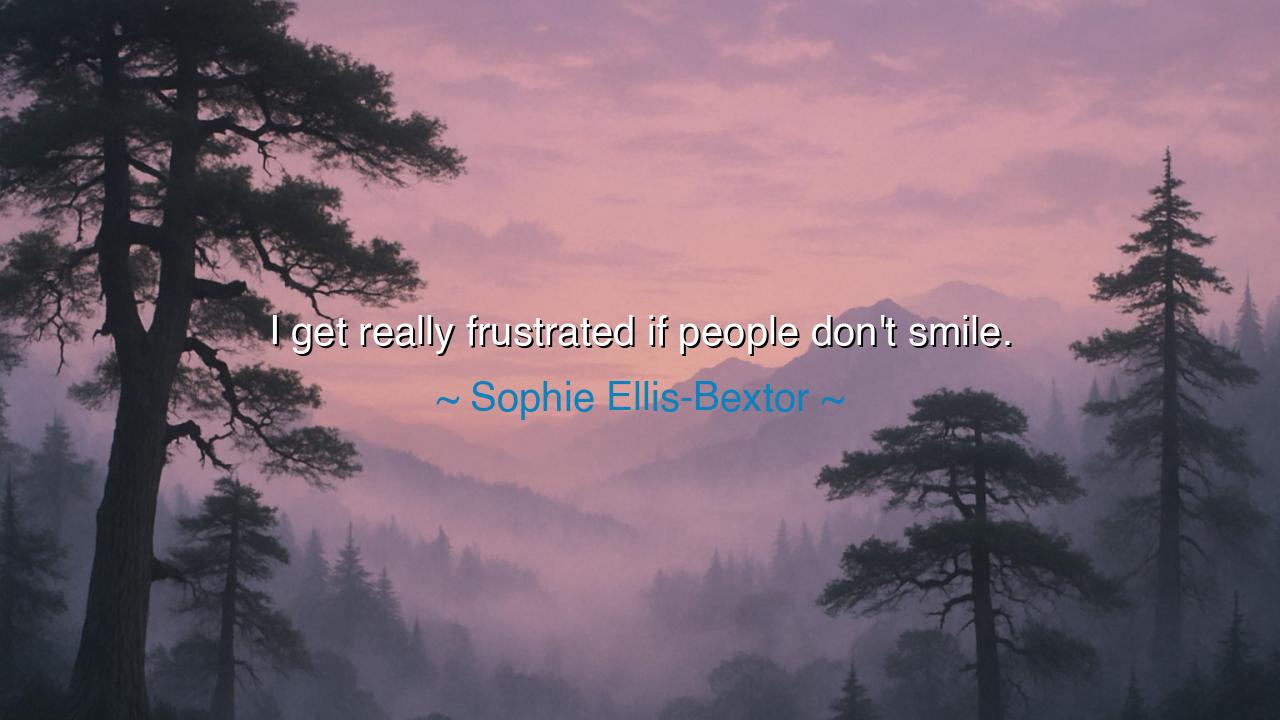
I get really frustrated if people don't smile.






In the words of Sophie Ellis-Bextor, the singer whose voice has carried both elegance and strength, we hear a simple phrase filled with deep human longing: “I get really frustrated if people don't smile.” At first glance, these words seem almost trivial, the observation of one who enjoys cheer. But when heard with the ear of wisdom, they reveal something eternal: that the smile is the mark of connection between souls, and its absence feels like a barrier too great to bear.
The smile is the oldest language of humanity. Long before speech was shaped, long before scripts were carved into stone, people understood the meaning of the upturned mouth and the brightened eyes. It is the sign of peace, the herald of fellowship, the unspoken contract that says: “I come without threat. I recognize you. I welcome you.” When Ellis-Bextor speaks of her frustration at its absence, she gives voice to a truth buried in us all: we crave this gesture because it reassures us that we are not alone.
The ancients knew this power. In the marketplaces of Athens and Rome, philosophers often remarked that the expression of the face could change the course of a conversation more swiftly than logic. A stranger’s frown could close the door to dialogue, but a smile could open it wider than any argument. Even in sacred texts and old traditions, the smiling face is associated with blessing and favor, while its absence is linked to suspicion or estrangement. To live in a world without smiles is to live in exile from trust.
History gives us powerful examples. Consider the Christmas Truce of 1914, during the First World War. Soldiers on both sides, weary of bloodshed, cautiously emerged from their trenches on a winter’s night. What first bridged the gap between enemies was not a treaty nor a proclamation, but a smile. Once the soldiers exchanged smiles, they shared songs, food, and even games of football. That brief peace was born not from politics but from the human face, unguarded and open. If those smiles had been withheld, the miracle of that truce would never have come to pass.
Ellis-Bextor’s frustration, then, is not mere impatience—it is the cry of the soul when denied recognition. When people do not smile, they refuse the bond that makes community possible. It is as though the river of human warmth has been dammed, and the flow of connection stopped. To her, as to many of us, this is unbearable, for it contradicts the very purpose of human fellowship. She reminds us that the smile is not luxury but necessity.
The lesson is clear: we must cultivate the habit of smiling, not as pretense, but as an offering. A true smile costs nothing, yet it may save a weary heart from despair. It can disarm anger, soothe anxiety, and awaken joy. To withhold it is to withhold one of the simplest and greatest gifts we can give. To offer it, even when words are absent, is to remind another soul that they are seen, valued, and not alone.
So, beloved seeker, carry this wisdom with you: do not underestimate the power of your smile. Use it to build bridges, to ease burdens, to turn strangers into friends. And when you feel the temptation to withhold it, remember Ellis-Bextor’s words, and the frustration she expressed—a frustration that is, in truth, a yearning for fellowship. For the world grows lighter each time a smile is shared, and darker each time it is withheld. Let your face, therefore, be a lantern of kindness, shining even in the shadowed places.






AAdministratorAdministrator
Welcome, honored guests. Please leave a comment, we will respond soon